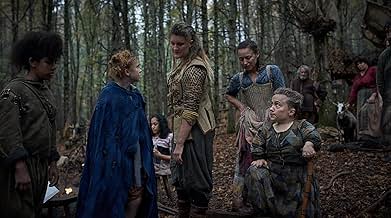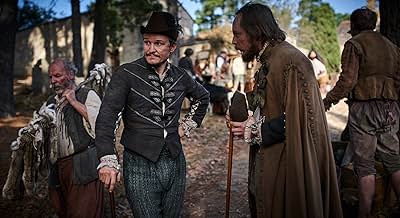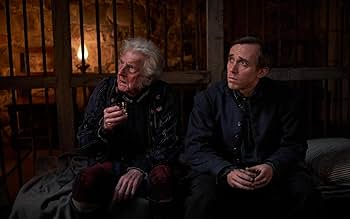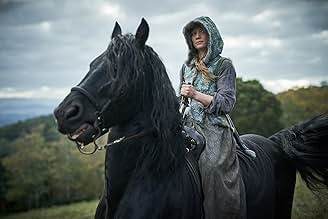Judy & Punch
- 2019
- 1h 45min
VALUTAZIONE IMDb
6,1/10
3141
LA TUA VALUTAZIONE
Aggiungi una trama nella tua linguaSeaside (nowhere near the sea), puppeteers Judy and Punch are trying to resurrect their marionette show in an an anarchic town on the brink of mob rule.Seaside (nowhere near the sea), puppeteers Judy and Punch are trying to resurrect their marionette show in an an anarchic town on the brink of mob rule.Seaside (nowhere near the sea), puppeteers Judy and Punch are trying to resurrect their marionette show in an an anarchic town on the brink of mob rule.
- Regia
- Sceneggiatura
- Star
- Premi
- 5 vittorie e 26 candidature totali
Recensioni in evidenza
Really enjoyed this movie. Great cinematography. Acting and score were engaging. It's violent but an insightful look at existing social norms and how important it is to question and challenge them in order to break down accepted stereotypes. Interesting contrast was how on the one hand alcohol was shown as a clear link to male aggression and violence. But on the other shown as a grease for social cohesion and supportive of fun and community. Unconscious biases are under the spotlight. As is ignorance. Power to Judy. Punch continues the chauvinistic dream albeit divorced from his new reality.
A really great ride. Such a fantastically well-realised medieval style of world that really sucks you in from the beginning. That may have been the best thing for me - its style and atmosphere was really engrossing and the score and music choices really helped that. Visually the film was very striking too. The main performances were excellent - the two leads, the small girl, the old man and the constable stand out. A really unique and well-thought take on punch and judy - it was clever how all the links to the show were brought in (many of which I didn't realise at the time). There were a couple of issues - a few performances here and there I didn't like that much - but overall it was really great and I look forward to seeing it again.
'Judy & Punch (2019)' is a reimagining of the long-standing, problematic 'Punch and Judy' puppet show, ostensibly from Judy's perspective. The concept is, I suppose, rather interesting; it's a feminine (no rape) revenge movie with the possibility of pointing out its source-material's numerous narrative flaws. Sadly, the piece never quite seems sure what it wants to be, delivering on the set-up but struggling through the pay-off. Its tone fluctuates wildly; it's unsure if it wants to be humorous or horrific. It's quirky, for sure. One of the main problems is just how much time we spend with Punch. The flick clearly wants to be Judy's story, empowering and unconventional; it ends up relegating her to the sidelines for quite a while, though. It doesn't live up to its potential, especially in this regard. Basically, the thing just never clicks. It feels rather awkward, in a way, and it's somewhat lacking in confidence. It isn't all that engaging, really. It also isn't particularly affecting and, frankly, it ought to be. Still, it isn't without its merits. Its conceit is, as I mentioned, intriguing and its message is solid. It's also reasonably entertaining, never even threatening to become dull. It's generally well-made and makes some distinct decisions, standing out from its peers in several aspects. It's a decent film, don't get me wrong; it's just not a great one. It doesn't quite connect the way it should and, ultimately, that's what lets it down. It still beats the puppets, though. 6/10
A well written, scripted and acted film with a brilliant cast who make the events of the movie seem so real !
Lacks direction in some parts but overall a lot of fun and fairly enjoyable, revenge is sweet !
The debut feature from Australian actress turned writer/director Mirrah Foulkes, working from an idea by English actress Lucy Punch and her brother Tom Punch (which, given the subject matter, seems like it's a joke, but isn't), Judy & Punch is a (very) dark comedy that presents the fictional background behind the early years of the (in)famous puppet show. Essentially a study in proto-feminism, a look at #MeToo sensibilities applied to a very un-#MeToo society, it's a strange mixture of Monty Python-esque slapstick and serious social critique, taking in misogyny, domestic violence, witchcraft, social stratification, and the exploitation of old age, and wrapping it all up in a gleefully anachronistic and pseudo-magical realist aesthetic, not entirely dissimilar to what you might find in the work of Angela Carter. It's a curious mix that really shouldn't work, and, for many, it probably won't. I can see some finding the tonal balance too skewered towards socio-political protest for it to work as a comedy, whereas others will argue that the comic elements undermine the seriousness of the socio-political agenda. For me, although the film is a beat too long at 105 minutes, I thought Foulkes just about got away with the tonal balancing act - most of the humour lands and most of the political material is well-handled. She's also helped immeasurably by strong performances across the board and a stunning visual design, which is especially accomplished given that this is her first feature.
In the town of Seaside (which, the opening legend informs us, is nowhere near the sea) in the English countryside, Judy (Mia Wasikowska) and Punch (Damon Herriman) are a young couple with an infant child. A Seaside-native, Judy ran away with Punch some years ago, with the duo going on to create the Punch & Judy puppet show. Judy is by far the more talented puppeteer, but Punch is a natural showman and a master of self-promotion, and is often called the "greatest puppeteer of his generation", despite not even being the greatest puppeteer of his marriage. However, his inability to control his drinking led to the show's reputation waning, and the two have now returned to Seaside. Although Judy is happy just getting on with life, when Punch hears that a talent-scout is in the area, he determines to curb his drinking and put on the best show he possibly can. Meanwhile, women guilty of such things as having a rash, looking at the moon for too long, and being the neighbour of a man whose chickens died, are being accused of witchcraft at such a rate that Seaside has a monthly "stoning day", to the apparent horror of no one except Judy and the town's meek new constable, Derrick (Benedict Hardie), who's in love with Judy (from afar). However, when Punch responds to a horrifying accident by viciously beating Judy, she embarks upon a mission of vengeance, joined by a band of women and children who have fled the town to avoid persecution.
You know from the get-go that a movie with the title Judy & Punch isn't going to be thematically subtle, and so it goes with Foulkes's film. Apart from Derrick and Scaramouche (Terry Norris), the senile husband of Maude (Brenda Palmer), Judy and Punch's elderly maid, literally every man in the film is a violent misogynistic thug. I don't bring this up by way of criticism, merely to illustrate that the film wears its themes, very proudly, on its sleeve. The Punch & Judy show itself, which invariably involves Punch beating Judy with a stick (itself not exactly a subtle phallic stand-in), has never been especially coy about its own thematic tropes, so why should a film inverting those tropes be otherwise? And, boy, does Foulkes invert them - we get Punch failing spectacularly (and hilariously) to look after their baby, we get sausage-related comedy, we get a troublesome dog, we get a police constable, we get an executioner, we even get a crocodile, but we get everything in service of a feminist rethread of the original's misogyny. Indeed, the more familiar you are with the show and its history, including its commedia dell'arte origins, the more fun you'll have with the film.
Without giving too much away, Judy & Punch is, at least in part, another entry in a subgenre we're seeing more and more of in recent years - gynocentric revenge films directed by women; Coralie Fargeat's spectacular Revenge (2017) and Jennifer Kent's haunting The Nightingale (2018) both spring to mind, but you could also include something like Isabella Eklöf's disturbing Holiday (2018), which is a rape/revenge drama without the revenge. At one point, someone watching the show asks, "does Punch always win?", and it's precisely this kind of societal assumption which Foulkes addresses - convention at the time may have been that, yes, Punch must always win, but Foulkes suggests life is far more complicated and far less predictable.
One of Judy & Punch's most obvious strengths is the aesthetic, with its lush and vibrant milieu - a realm that's not quite fantasy, not quite historical reality. The town of Seaside, for all its vivid Renaissance-era squalor, is that of a fairy-tale allegory - the kind you'd expect to see terrorised by a werewolf or a giant. Production designer Josephine Ford has a field-day, having seemingly been turned loose to indulge herself. One half-expects to see a gingerbread house in the background. What's especially interesting, however, is that cinematographer Stefan Duscio shoots the whole thing completely realistically, setting up a fascinating aesthetic juxtaposition which adds to the magical realism immensely.
Enhancing the surreality even more is the electronic score by François Tétaz, which has no place in a film of this time-period (aside from Tétaz's score, the soundtrack also features a rocking electronic adaptation of Johann Sebastian Bach's "Air on a G String" and even Leonard Cohen's "Who by Fire"). Despite how out of place this should be, it works wonderfully with the stylistic trappings of Foulkes's weird anachronistic vibe. Equally important here is the dialogue, which is a mixture of period-correct diction and a more modern inflection (one character even quotes one of the best-known speeches from Il gladiatore (2000), earning the biggest laugh at the screening I attended). Put it this way - at one point, we see a group of characters in Renaissance costumes doing tai chi. If that sounds like something you'd find funny, you'll love this exceptionally-realised world.
I'd be remiss here if I didn't briefly mention the acting, which is universally terrific. All the supporting players do fine jobs - Norris's Scaramouche is all politeness and confusion, whilst Palmer's Maude is all loyalty and kindness. But what comes across most is their deep love - they're the kind of elderly couple that still hold hands on a walk even though they've been married for decades. Really sweet stuff. Hardie is equally good as the one good man in a town of troublemakers. But unlike the characters played by Clint Eastwood, Derrick has zero authority and no respect. However, despite his ineffectual nature, Hardie plays him as a completely straight-shooter, true, and honest, and it's a testament to his portrayal that Derrick is more than just the punchline of a few gags. He has real interiority. Obviously, Wasikowska has the meatiest role, and her performance is similar to some of her previous work, but nevertheless, her Judy isn't just a vehicle for feminist rhetoric, she's a capable and fierce woman in her own right. For me, however, Herriman steals the show. Initially, he makes Punch seem contemptible, yet somehow, as the film goes on, he makes the character even less likeable. His work in the penultimate scene is especially strong, where he has to play the part so as to communicate one thing to the other characters and something else entirely to the audience. Superb stuff.
The film does, however, have some problems. As mentioned, for some it will be too funny to work as feminist critique, and for others, too serious to work as comedy. Others still might argue it works as neither because it never fully commits to either. Without a doubt, Foulkes walks a very fine line trying to maintain such a delicate balance. I think she pulls it off, but others won't, that's just the nature of tonally ambiguous films such as this. The narrative and dialogue are also extraordinarily on the nose on occasion. As I said above, I didn't mind this, but some people will have a problem with how direct are lines such as, "what is a witch but a person who exists outside your blinkered view of society?" A few of the themes are also under-explored, including domestic violence, which seems to have been included as a plot point simply because it's an issue in the original show - Foulkes never really takes it anywhere.
Nevertheless, I enjoyed Judy & Punch. A statement on oppression and female (re)assertion, it takes the best-known elements of a world-famous puppet show, and inverts them, turning an inherently misogynistic story into a celebration of early feminism. Allegorical in both visual and narrative design, it may be pantomime-esque, but so too is it compelling enough to turn what could have been dismissed as a nasty fairy-tale into a piece of work which is thematically relevant to the milieu in which we now reside.
In the town of Seaside (which, the opening legend informs us, is nowhere near the sea) in the English countryside, Judy (Mia Wasikowska) and Punch (Damon Herriman) are a young couple with an infant child. A Seaside-native, Judy ran away with Punch some years ago, with the duo going on to create the Punch & Judy puppet show. Judy is by far the more talented puppeteer, but Punch is a natural showman and a master of self-promotion, and is often called the "greatest puppeteer of his generation", despite not even being the greatest puppeteer of his marriage. However, his inability to control his drinking led to the show's reputation waning, and the two have now returned to Seaside. Although Judy is happy just getting on with life, when Punch hears that a talent-scout is in the area, he determines to curb his drinking and put on the best show he possibly can. Meanwhile, women guilty of such things as having a rash, looking at the moon for too long, and being the neighbour of a man whose chickens died, are being accused of witchcraft at such a rate that Seaside has a monthly "stoning day", to the apparent horror of no one except Judy and the town's meek new constable, Derrick (Benedict Hardie), who's in love with Judy (from afar). However, when Punch responds to a horrifying accident by viciously beating Judy, she embarks upon a mission of vengeance, joined by a band of women and children who have fled the town to avoid persecution.
You know from the get-go that a movie with the title Judy & Punch isn't going to be thematically subtle, and so it goes with Foulkes's film. Apart from Derrick and Scaramouche (Terry Norris), the senile husband of Maude (Brenda Palmer), Judy and Punch's elderly maid, literally every man in the film is a violent misogynistic thug. I don't bring this up by way of criticism, merely to illustrate that the film wears its themes, very proudly, on its sleeve. The Punch & Judy show itself, which invariably involves Punch beating Judy with a stick (itself not exactly a subtle phallic stand-in), has never been especially coy about its own thematic tropes, so why should a film inverting those tropes be otherwise? And, boy, does Foulkes invert them - we get Punch failing spectacularly (and hilariously) to look after their baby, we get sausage-related comedy, we get a troublesome dog, we get a police constable, we get an executioner, we even get a crocodile, but we get everything in service of a feminist rethread of the original's misogyny. Indeed, the more familiar you are with the show and its history, including its commedia dell'arte origins, the more fun you'll have with the film.
Without giving too much away, Judy & Punch is, at least in part, another entry in a subgenre we're seeing more and more of in recent years - gynocentric revenge films directed by women; Coralie Fargeat's spectacular Revenge (2017) and Jennifer Kent's haunting The Nightingale (2018) both spring to mind, but you could also include something like Isabella Eklöf's disturbing Holiday (2018), which is a rape/revenge drama without the revenge. At one point, someone watching the show asks, "does Punch always win?", and it's precisely this kind of societal assumption which Foulkes addresses - convention at the time may have been that, yes, Punch must always win, but Foulkes suggests life is far more complicated and far less predictable.
One of Judy & Punch's most obvious strengths is the aesthetic, with its lush and vibrant milieu - a realm that's not quite fantasy, not quite historical reality. The town of Seaside, for all its vivid Renaissance-era squalor, is that of a fairy-tale allegory - the kind you'd expect to see terrorised by a werewolf or a giant. Production designer Josephine Ford has a field-day, having seemingly been turned loose to indulge herself. One half-expects to see a gingerbread house in the background. What's especially interesting, however, is that cinematographer Stefan Duscio shoots the whole thing completely realistically, setting up a fascinating aesthetic juxtaposition which adds to the magical realism immensely.
Enhancing the surreality even more is the electronic score by François Tétaz, which has no place in a film of this time-period (aside from Tétaz's score, the soundtrack also features a rocking electronic adaptation of Johann Sebastian Bach's "Air on a G String" and even Leonard Cohen's "Who by Fire"). Despite how out of place this should be, it works wonderfully with the stylistic trappings of Foulkes's weird anachronistic vibe. Equally important here is the dialogue, which is a mixture of period-correct diction and a more modern inflection (one character even quotes one of the best-known speeches from Il gladiatore (2000), earning the biggest laugh at the screening I attended). Put it this way - at one point, we see a group of characters in Renaissance costumes doing tai chi. If that sounds like something you'd find funny, you'll love this exceptionally-realised world.
I'd be remiss here if I didn't briefly mention the acting, which is universally terrific. All the supporting players do fine jobs - Norris's Scaramouche is all politeness and confusion, whilst Palmer's Maude is all loyalty and kindness. But what comes across most is their deep love - they're the kind of elderly couple that still hold hands on a walk even though they've been married for decades. Really sweet stuff. Hardie is equally good as the one good man in a town of troublemakers. But unlike the characters played by Clint Eastwood, Derrick has zero authority and no respect. However, despite his ineffectual nature, Hardie plays him as a completely straight-shooter, true, and honest, and it's a testament to his portrayal that Derrick is more than just the punchline of a few gags. He has real interiority. Obviously, Wasikowska has the meatiest role, and her performance is similar to some of her previous work, but nevertheless, her Judy isn't just a vehicle for feminist rhetoric, she's a capable and fierce woman in her own right. For me, however, Herriman steals the show. Initially, he makes Punch seem contemptible, yet somehow, as the film goes on, he makes the character even less likeable. His work in the penultimate scene is especially strong, where he has to play the part so as to communicate one thing to the other characters and something else entirely to the audience. Superb stuff.
The film does, however, have some problems. As mentioned, for some it will be too funny to work as feminist critique, and for others, too serious to work as comedy. Others still might argue it works as neither because it never fully commits to either. Without a doubt, Foulkes walks a very fine line trying to maintain such a delicate balance. I think she pulls it off, but others won't, that's just the nature of tonally ambiguous films such as this. The narrative and dialogue are also extraordinarily on the nose on occasion. As I said above, I didn't mind this, but some people will have a problem with how direct are lines such as, "what is a witch but a person who exists outside your blinkered view of society?" A few of the themes are also under-explored, including domestic violence, which seems to have been included as a plot point simply because it's an issue in the original show - Foulkes never really takes it anywhere.
Nevertheless, I enjoyed Judy & Punch. A statement on oppression and female (re)assertion, it takes the best-known elements of a world-famous puppet show, and inverts them, turning an inherently misogynistic story into a celebration of early feminism. Allegorical in both visual and narrative design, it may be pantomime-esque, but so too is it compelling enough to turn what could have been dismissed as a nasty fairy-tale into a piece of work which is thematically relevant to the milieu in which we now reside.
Lo sapevi?
- QuizPunch's wife was originally called Joan. In the British Punch and Judy show, Punch speaks in a distinctive squawking voice, produced by a contrivance known as a swazzle or swatchel which the professor holds in his mouth, transmitting his gleeful cackle. This gives Punch a vocal quality as though he were speaking through a kazoo. Joan's name was changed to Judy because Judy was easier to enunciate with the swazzle than Joan.
- BlooperThe film is set in 17th Century England and London is referred to as "the Big Smoke". However, it didn't earn this nickname until the 19th Century, due to the coal then being used to heat Londoner's homes producing large amounts of smoke.
- Curiosità sui creditiThe cast are credited with either 'Ms' or 'Mr' in front of their names.
- ConnessioniSpoofs Il gladiatore (2000)
I più visti
Accedi per valutare e creare un elenco di titoli salvati per ottenere consigli personalizzati
Dettagli
Botteghino
- Lordo in tutto il mondo
- 199.360 USD
- Tempo di esecuzione1 ora 45 minuti
- Colore
- Mix di suoni
- Proporzioni
- 2.35 : 1
Contribuisci a questa pagina
Suggerisci una modifica o aggiungi i contenuti mancanti































